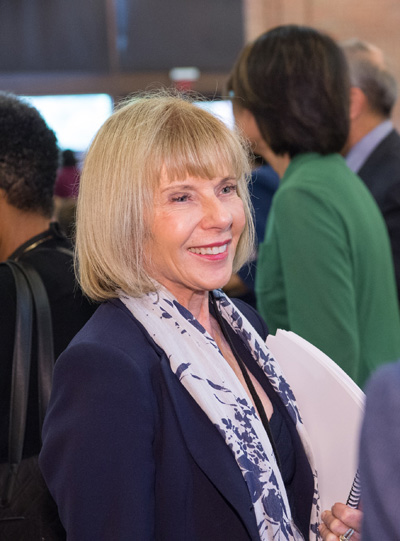
Elizabeth L. Travis, PhD, is the associate vice president of women and minority faculty inclusion at The University of Texas MD Anderson Cancer Center. She is an ELAM fellow of 2000 and recently attended the 2017 ELAM Leaders Forum where she gave a speech to many graduating fellows and alumni.
How has ELAM helped create a more inclusive environment in academic medicine, dentistry, public health and pharmacy?
ELAM has been critical to an inclusive culture in all of academic medicine and many other fields. Scott Page always said diversity is a numbers issue. You count the numbers, but he says what’s really important is making those numbers count. In other words, are you being inclusive? You may have numbers, but are they at the table or on the committees. ELAM has done a wonderful job of accomplishing that. I think they have, number one, made women realize that they can do this, that they can be deans, that they can be department chairs, that they are leaders. That, in itself, is a huge accomplishment, because there are a lot of women now who know that, who feel that, who want that, and actually who are.
What skills should ELAM give to ELUMs and fellows in the future to best prepare them to lead in academic medicine, dentistry, public health and pharmacy?
Finances, finances, finances. Follow the money. It’s an absolutely critical skill. You need to know how you’re funded and be able to follow the money. I know that ELAM has been doing this since the beginning of time because they recognize that it’s difficult to be a leader unless you understand the funding. Our job is not to be in the red in academic medical centers. Our job is to be in the black.
ELAM also does a great job preparing people to lead by helping them understand how to build relationships. The networks that women develop when they’re here, they carry throughout their life. I’m an ELAM fellow from a long time ago, but the women that I’ve been sending over the past ten years say the most important thing that they find here, in addition to the learning and the skills, is the networks. It’s the meeting other people and the networks they develop. I also think that we have to remember that we cannot remain in an echo chamber. We have to engage our male colleagues, who are champions of having women in leadership positions and training women. There are a number of deans—male deans—who definitely get that, support that, and want to see things change.
How can ELUMs give back to the ELAM program?
I’ve thought a lot about mentor versus sponsorship over the past few years. I think we as senior women in the field have a responsibility and a duty to pay it forward. Paying it forward means bringing up talent that’s behind us and looking deep in our organizations and across our fields and bringing along the outstanding talent and sponsoring them. That means recommending them for positions. That means putting them forward to be in a chair position. That means putting them on committees. That means making sure that we get them to ELAM and other development programs. I think, for us, there are many rewards. I can’t think of something that’s more fulfilling than the legacy of developing future leaders and knowing you’re leaving your profession in really good hands. You get known to have an eye for talent. As ELUMs, we need to help them. We need to mentor, but we need to sponsor them. We need to sponsor them. Mentoring is not enough.
What advice would you give to recent ELUMs or future fellows?
It is a marathon, not a sprint. You can’t be discouraged or take things personally. They may be personal, but you can’t take them that way. You just have to look beyond that. Learn from failures if you have them; learn from whatever challenges that you have. Stay in touch with your fellow ELUMs and build those networks.
The fellows need to apply for the positions. They need to understand that they are ready for these jobs. You are ready, and you need to step up to the plate. If there’s any thought in your head that people are saying, “Well, she only got that because she’s a woman,” forget that. Just get in there and do the job and do it well.
How do you stay connected personally to the ELAM program?
I go to the ELUM meetings. I’m involved in the alumni activity. I’m very involved in the group that’s interested in promoting the ELUMs, getting involved and getting women in leadership positions. I am on the selection committee. I just stay connected through working in the organization, helping in whatever way I can. Every time I go to an ELAM event, I learn something, and there are some wonderful new ideas that the fellows are bringing. The work they’re doing is so exciting and just very—it gives me great confidence in our future.
How has ELAM affected your career?
ELAM has had a huge impact on me in terms of understanding myself a little more, understanding where I have my gaps, and the recognition that, again, it’s not always personal. It’s also the recognition that failure is okay. What do you learn from that, and where do you go from there? For me, it’s very much a part of my life. I feel very connected because I feel that ELAM—not only when I was a fellow, but throughout my career—has taught me that when I have a question about something, when something’s not going right, I can reach out to my colleagues and my network. They are my support. When I need them, they’re always there. I would be lost without them, quite frankly.